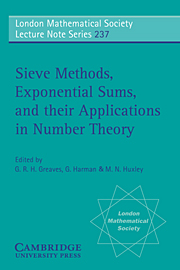Book contents
- Frontmatter
- Contents
- Foreword
- Index of Authors
- Participants in the Symposium
- 1 The Exceptional Set for Goldbach's Problem in Short Intervals
- 2 On an Additive Property of Stable Sets
- 3 Squarefree Values of Polynomials and the abc-Conjecture
- 4 The Values of Binary Linear Forms at Prime Arguments
- 5 Some Applications of Sieves of Dimension exceeding 1
- 6 Representations by the Determinant and Mean Values of L-Functions
- 7 On the Montgomery-Hooley Asymptotic Formula
- 8 Franel Integrals
- 9 Eratosthenes, Legendre, Vinogradov and beyond
- 10 On Hypothesis K* in Waring's Problem
- 11 Moments of Differences between Square-free Numbers
- 12 On the Ternary Additive Divisor Problem and the Sixth Moment of the Zeta-Function
- 13 A Variant of the Circle Method
- 14 The Resemblance of the Behaviour of the Remainder Terms Eσ(t), Δ1-2σ(x) and R(σ + it)
- 15 A Note on the Number of Divisors of Quadratic Polynomials
- 16 On the Distribution of Integer Points in the Real Locus of an Affine Toric Variety
- 17 An Asymptotic Expansion of the Square of the Riemann Zeta-Function
- 18 The Mean Square of Dedekind Zeta-Functions of Quadratic Number Fields
- 19 Artin's Conjecture and Elliptic Analogues
5 - Some Applications of Sieves of Dimension exceeding 1
Published online by Cambridge University Press: 03 February 2010
- Frontmatter
- Contents
- Foreword
- Index of Authors
- Participants in the Symposium
- 1 The Exceptional Set for Goldbach's Problem in Short Intervals
- 2 On an Additive Property of Stable Sets
- 3 Squarefree Values of Polynomials and the abc-Conjecture
- 4 The Values of Binary Linear Forms at Prime Arguments
- 5 Some Applications of Sieves of Dimension exceeding 1
- 6 Representations by the Determinant and Mean Values of L-Functions
- 7 On the Montgomery-Hooley Asymptotic Formula
- 8 Franel Integrals
- 9 Eratosthenes, Legendre, Vinogradov and beyond
- 10 On Hypothesis K* in Waring's Problem
- 11 Moments of Differences between Square-free Numbers
- 12 On the Ternary Additive Divisor Problem and the Sixth Moment of the Zeta-Function
- 13 A Variant of the Circle Method
- 14 The Resemblance of the Behaviour of the Remainder Terms Eσ(t), Δ1-2σ(x) and R(σ + it)
- 15 A Note on the Number of Divisors of Quadratic Polynomials
- 16 On the Distribution of Integer Points in the Real Locus of an Affine Toric Variety
- 17 An Asymptotic Expansion of the Square of the Riemann Zeta-Function
- 18 The Mean Square of Dedekind Zeta-Functions of Quadratic Number Fields
- 19 Artin's Conjecture and Elliptic Analogues
Summary
We combine the sieves of [1], [2] with the weighted sieve procedure of [3], Chapter 10, to formulate a general theorem about the incidence of almost-primes in integer sequences; and we illustrate the quality of this machinery with many concrete results about almost-primes representable by polynomials with integer or prime arguments.
Chapter 10.1 of [3] describes a weighted sieve procedure which, in combination with upper and lower sieve estimates of dimension κ > 1, leads to a general result of the following kind: given a finite integer sequence A and a set P of primes, then subject only to some rather weak conditions on the pair A, P, one can assert that A contains a large number of almost-primes Pr — numbers having at most r prime factors counted according to multiplicity — with r relatively small, made up of primes from P. Since [3] is currently out of print and higher dimensional sieves superior to those described in Chapter 7 of [3] are now available (see [1], [2]), we state here an improved version of such a general result and describe various applications to integer sequences generated by reducible polynomials that are superior to those presented in Chapter 10.3 of [3].
Let A be a finite integer sequence whose members are not necessarily all positive or distinct.
- Type
- Chapter
- Information
- Publisher: Cambridge University PressPrint publication year: 1997
- 8
- Cited by

